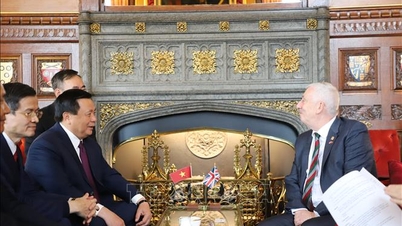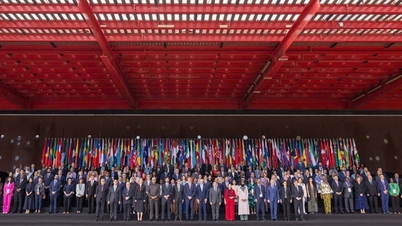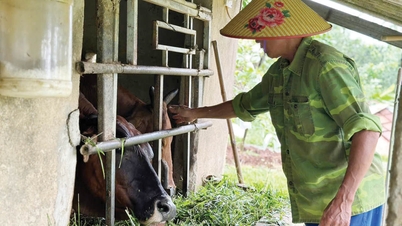The UK's new Labour-led government is facing its toughest choices yet.
This is the warning issued by the International Monetary Fund (IMF) right after the party of new Prime Minister Keir Starmer won a resounding victory in the general election, ending 14 years of rule by the Conservative Party.
 |
| British Prime Minister Keir Starmer and reporters on their way to Washington for the NATO Summit, July 2024. (Source: Reuters) |
The "bet"
The new government is betting that an economic plan modelled on US President Joe Biden's economic policies - "Bidenomics" - will reverse more than a decade of economic recession and lift long-stagnant living standards in the UK economy, without requiring spending beyond budget.
Is that possibility easy?
Like President Biden, Prime Minister Keir Starmer has pledged a more dynamic government than his Conservative predecessor, as well as increased investment in green energy and industrial policies to boost domestic manufacturing.
However, observers say that Prime Minister Starmer “inherited” an economy that had suffered from more than a decade of political turmoil, inadequate business investment and rigid planning from the previous government. Not only that, the UK currently lacks available investment capital.
According to research by the Centre for Economic Performance (UK), adjusted for inflation, wages in this economy have barely changed since 2007. As a result, they are falling behind, with the average German now 20% richer than the typical British citizen.
“The UK economy is no longer in a position to quickly recover,” said David Page, a researcher at AXA Investment Managers in London, according to the Washington Post. “Most people think it will take at least a decade for the economy to show improvement.”
The root of Britain’s economic woes, according to analysis, lies in weak productivity growth. Boosting worker productivity to produce more goods per hour is the key to expanding the economy and raising living standards. That is what has been missing from the previous British government’s recent “performance”.
In fact, an American worker last year produced 23% more than a British worker. That gap has more than doubled since 2007. French and German workers both outperform their British counterparts.
British manufacturing productivity, which had been rising steadily for nearly three decades, has stalled since the 2008 financial crisis. Economists say government austerity and repeated political crises following the Great Recession have prevented companies from investing to make workers more productive. The Covid-19 pandemic and government budget cuts that have left the National Health Service understaffed have hurt productivity. In the US, business investment has risen by more than a third since 2016, nearly seven times the increase in the UK, according to statistics.
Britain’s problems are a legacy of years of interplay between public and private choices. The country’s large financial services sector shrank after the 2008 crisis, making access to credit harder than elsewhere. The economy has faced a crisis of “austerity,” which has damaged public services and stunted economic growth.
The Brexit process, which has taken three prime ministers since 2016 and continues to cast a shadow over the economy, has seen the UK economy shrink by 4% and imports and exports fall by around 15% compared to when the country was in the bloc, according to the Office for Budget Responsibility (OBR).
Government instability and myriad short-term and long-term economic plans become obstacles to growth.
Expect the difference
In his first press conference, Prime Minister Starmer affirmed that he would push for change and realise the commitments in the election platform, including stimulating economic growth, investing in clean energy and improving opportunities through a new skills agenda.
New Finance Minister Rachel Reeves affirmed that the government will implement a new approach to growth based on stability, investment and innovation, emphasizing that planning reform is an important factor to promote growth. The Ministry of Finance is committed to taking immediate action to solve the fundamental problems of the UK economy, reforming the national planning policy framework to develop infrastructure, promoting sustainable growth based on a new model, helping the economy develop and keeping taxes, inflation and interest rates at the lowest possible levels...
The head of the UK finance industry pledged to make the UK an investment paradise, supporting growth and an industrial strategy to boost investment, working closely with business.
The new industrial strategy will focus on areas such as advanced manufacturing, creative and green technologies, and emerging industries such as life sciences, quantum computing and artificial intelligence, where the UK has a strong research base but has not yet created the conditions for growth. A £7.3 billion national investment fund will be established to invest in key projects.
As part of its election pledge, Prime Minister Starmer's government wants to demonstrate that Labour is committed to serious planning reforms that will stimulate growth without increasing public spending or national debt.
However, analysts say the new growth plan will face many challenges. Given the weak financial outlook, UK government debt could exceed 90% of GDP this year.
Paul Johnson, Director of the UK Institute for Fiscal Studies (IFS), said that with high inflation, high public debt and record-high taxes, the outlook is “extremely difficult” for a new government that wants to implement breakthroughs without being able to spend money.
“Reality will start to set in as the new government under Prime Minister Keir Starmer has to focus on areas where it can really make a difference without spending a lot of money,” said Paul Dales, chief economist at Capital Economics.
Source: https://baoquocte.vn/chinh-phu-moi-cua-vuong-quoc-anh-nhung-lua-chon-kho-khan-279275.html



![[Photo] The 1st Congress of Phu Tho Provincial Party Committee, term 2025-2030](https://vphoto.vietnam.vn/thumb/1200x675/vietnam/resource/IMAGE/2025/9/30/1507da06216649bba8a1ce6251816820)
![[Photo] General Secretary To Lam receives US Ambassador to Vietnam Marc Knapper](https://vphoto.vietnam.vn/thumb/1200x675/vietnam/resource/IMAGE/2025/9/29/c8fd0761aa184da7814aee57d87c49b3)

![[Photo] Solemn opening of the 12th Military Party Congress for the 2025-2030 term](https://vphoto.vietnam.vn/thumb/1200x675/vietnam/resource/IMAGE/2025/9/30/2cd383b3130d41a1a4b5ace0d5eb989d)
![[Photo] General Secretary To Lam, Secretary of the Central Military Commission attends the 12th Party Congress of the Army](https://vphoto.vietnam.vn/thumb/1200x675/vietnam/resource/IMAGE/2025/9/30/9b63aaa37ddb472ead84e3870a8ae825)



























![[Photo] General Secretary To Lam attends the ceremony to celebrate the 80th anniversary of the post and telecommunications sector and the 66th anniversary of the science and technology sector.](https://vphoto.vietnam.vn/thumb/1200x675/vietnam/resource/IMAGE/2025/9/29/8e86b39b8fe44121a2b14a031f4cef46)

































































Comment (0)